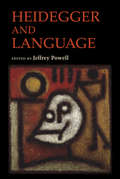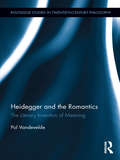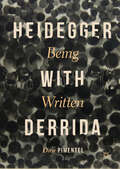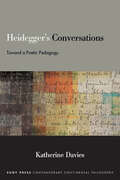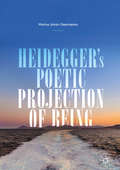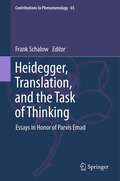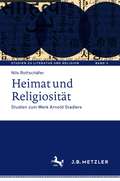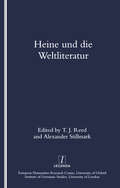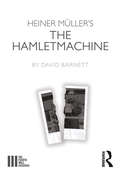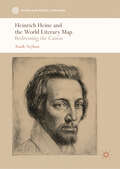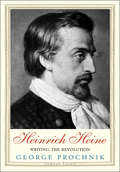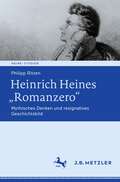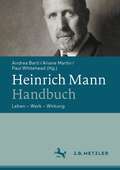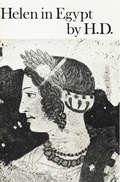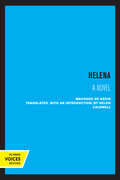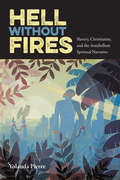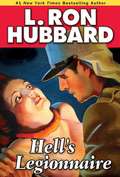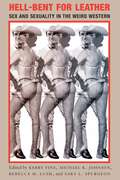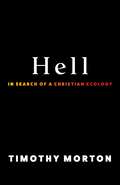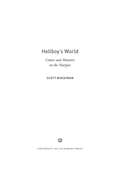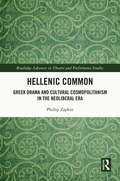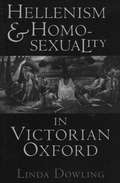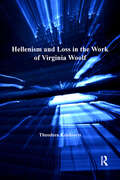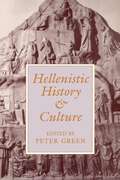- Table View
- List View
Heidegger and Language
by Jeffrey PowellThe essays collected in this volume take a new look at the role of language in the thought of Martin Heidegger to reassess its significance for contemporary philosophy. They consider such topics as Heidegger's engagement with the Greeks, expression in language, poetry, the language of art and politics, and the question of truth. Heidegger left his unique stamp on language, giving it its own force and shape, especially with reference to concepts such as Dasein, understanding, and attunement, which have a distinctive place in his philosophy.
Heidegger and the Romantics: The Literary Invention of Meaning (Routledge Studies in Twentieth-Century Philosophy)
by Pol VandeveldeWhile there are many books on the romantics, and many books on Heidegger, there has been no book exploring the connection between the two. Pol Vandevelde’s new study forges this important link. Vandevelde begins by analyzing two models that have addressed the interaction between literature and philosophy: early German romanticism (especially Schlegel and Novalis), and Heidegger’s work with poetry in the 1930s. Both models offer an alternative to the paradigm of mimesis, as exemplified by Aristotle’s and Plato’s discussion of poetry, and both German romanticism and Heidegger owe a deep debt to Plato. The study goes on to defend the view that Heidegger was influenced by romanticism. The author’s project is thus both historical, showing the specificity of the romantic and Heideggerean works, and systematic, defending aspects of their alternative mode of thinking while also pointing to their weaknesses.
Heidegger with Derrida: Being Written
by Dror PimentelHeidegger with Derrida: Being Written attempts, for the first time, to think Heidegger's philosophy through the lens of Derrida's logocentric thesis, according to which speech has, throughout the history of metaphysics, been given primacy over writing. The book offers a detailed account of Derrida's arguments about the debasement of writing, an account that leads to a new definition of writing, conceiving it epistemically, rather than linguistically. Heidegger's analysis of the gaze and critique of the modern subject are shown to have logocentric features. This surprising conclusion entails that Heidegger is well within the metaphysical tradition, which he labored so intently to overcome. The book sheds new light on the philosophical roots of Heidegger’s involvement with Nazism, arguing that his hierarchical thinking--the hallmark of logocentrism and metaphysics—condones violent differentiation between the ‘proper’ race and the Other.
Heidegger's Conversations: Toward a Poetic Pedagogy (SUNY series in Contemporary Continental Philosophy)
by Katherine DaviesReading Martin Heidegger's five conversational texts together for the first time, Heidegger's Conversations elaborates not only what Heidegger thought but how he did so by attending to the philosophical possibilities of the genre of these under-studied texts written between 1944 and 1954. Though he wrote little on the topic of teaching and learning explicitly, Katherine Davies shows Heidegger performed an implicit poetic pedagogy in his conversations that remains to be recognized. Heidegger launched an experimental attempt to enact a learning of non-representational, non-metaphysical thinking by cultivating a distinctly collaborative sensitivity to the call of the poetic. Davies illustrates how each conversation emphasizes a particular pedagogical element—non-oppositionality, making mistakes, thinking in community, poetic interpretation, and the dangers of such pedagogy—which together constitute the developmental arc of these texts. Whether Heidegger is revising or reinforcing his own earlier pedagogical practices, Davies argues that attending to the dramatic staging of the conversations offers a distinct vantage point from which to contend with Heidegger's philosophy and politics in the post-war period.
Heidegger's Poetic Projection of Being
by Marius Johan GeertsemaThis book investigates the relationship between poetry and ontology in the works of Martin Heidegger. It explains the way in which Heidegger’s dialogue with poetry forms an essential step on the path of overcoming metaphysics and thinking the openness of presence. Heidegger’s engagement with poetry is an important moment in the development of his philosophy—or rather thinking of Being. Being speaks itself poetically in his view. Rather than a logician or a thinker, Being is the first poet.
Heidegger, Translation, and the Task of Thinking
by F. SchalowNumerous volumes have been written on the philosophy of Martin Heidegger, and new translations of his writings appear on a regular basis. Up to now, however, no book has addressed the connections between Heidegger's thought and the hermeneutic methodology involved in translating his works - or any other text. Gathering essays by internationally recognized scholars, this volume examines the specific synergy that holds between Heidegger's thinking and the distinctive endeavor of translation. Heidegger, Translation, and the Task of Thinking: Essays in Honor of Parvis Emad offers scholars and students alike a rare journey into the insights and intricacies of one of the greatest philosophers of the twentieth century. The book also pays homage to Parvis Emad, Professor Emeritus of Philosophy at De Paul University, founder of the journal Heidegger Studies and a renowned translator of Heidegger's writings. Heidegger, Translation, and the Task of Thinking: Essays in Honor of Parvis Emad provides a uniquely focused perspective on Heidegger's thought, and delves into the strategies and controversies that attend all attempts to translate his most complex and challenging texts, including his seminal works Contributions to Philosophy and Mindfulness. Accordingly, this book will be of great interest and benefit to anyone working in the fields of phenomenology, hermeneutics, or Heidegger studies.
Heimat und Religiosität: Studien zum Werk Arnold Stadlers (Studien zu Literatur und Religion / Studies on Literature and Religion #3)
by Nils RottschäferDas Werk Arnold Stadlers, das sich aus der lebendigen Sprache, aus dem Konkreten und Ambivalenten der heimatlichen Lebenswelt speist, hat Teil an dem Diskurs über Zugehörigkeit, über Angekommen- und Angenommen-Sein in einer globalisierten Welt. ‚Heimat‘ und ‚Religiosität‘ bilden die strukturbildenden Komplexe seines hochreflektierten Werks, die hier in ihrer Bezogenheit aufeinander gedeutet werden. Die Engführung beider Phänomene, nach der sich die literarischen Figuren Stadlers sehnen, fungiert als grundlegendes poetisches Prinzip der Texte. Auch die Religion kann zu einer erfahrbaren sozialen Heimat werden, die Heimat kann ebenso religiöse Züge annehmen.
Heine Und Die Weltliteratur
by T. J. Reed"The 1997 London Heine Conference brought together leading scholars and critics from Austria, Britain and Germany. The essays collected in this volume offer a broad canvas of Heine's themes and techniques, his debts and his influence, the ancient and modern connections of his work, its epic and lyrical forms, together with materials and comparisons drawn from English, German, Russian, Jewish and Islamic sources, and the musical settings of his poems. The collection complements recent scholarship, much of which has explored Heine's theoretical and other prose works, by paying close attention once more to the inexhaustible riches of his poetry."
Heiner Müller's The Hamletmachine (The Fourth Wall)
by David Barnett"I’m good Hamlet gi’me a cause for grief" At first glance, readers of The Hamletmachine (1979) could be forgiven for wondering whether it is actually a play at all: it opens with a montage of texts that are not ascribed to a character, there is no vestige of a plot, and the whole piece lasts a total of ten pages. Yet, Heiner Müller’s play regularly features in theatres’ repertoires and is frequently staged by university theatre departments. In four short chapters, David Barnett unpicks the complexities of The Hamletmachine’s writing and frames its author as an experimental, politically committed writer who confronts the shortcomings of his age. In considering the problems Müller poses for the play’s performance, he also discusses two exemplary productions in order to show how the work can engage very different audiences. This book examines why such a compact, radically open, and yet seemingly obscure play has proved so popular.
Heinrich Glarean's Books
by Iain Fenlon Inga Mai GrooteThis collection of essays investigates the work of Heinrich Glarean, one of the most influential humanists and music theorists of the sixteenth century. For the first time, Glarean's musical writings, including his masterwork the Dodekachordon, are considered in the wider context of his work in a variety of disciplines such as musicology, history, theology and geography. Contributors reference books from Glarean's private library, including rare and previously unseen material, to explore his strategies and impact as a humanist author and university teacher. The book also uses other newly discovered source material such as course notes written by students and Glarean's preparations for his own lectures to offer a fascinating picture of his reactions to contemporary debates. Providing a detailed analysis of Glarean's library as reconstructed from the surviving copies, Heinrich Glarean's Books offers new and exciting perspectives on the multi-disciplinary work of an accomplished intellectual.
Heinrich Heine and the World Literary Map: Redressing The Canon (Canon and World Literature)
by Azade SeyhanThis text provides a key reassessment of the German author Heinrich Heine’s literary status, arguing for his inclusion in the Canon of World Literature. It examines a cross section of Heine’s work in light of this debate, highlighting the elusive and ironic tenor of his many faceted prose works, from his philosophical and political satire to his reassessment of Romantic idealism in Germany and the unique self-reflexivity of his work. It notably focuses on the impact of exile, belonging, exclusion, and censorship in Heine’s work and analyzes his legacy in a world literary context, comparing his poetry and prose with those of major modern writers, such as Pablo Neruda, Nazım Hikmet, or Walter Benjamin, who have all been persecuted and exiled yet used their art as resistance against oppression and silencing. At a time when a premium is placed on the value of world literatures and transnational writing, Heine emerges once again as a writer ahead of his time and of timeless appeal.
Heinrich Heine: Writing the Revolution (Jewish Lives)
by George ProchnikA thematically rich, provocative, and lyrical study of one of Germany’s most important, world-famous, and imaginative writers Heinrich Heine (1797–1856) was a virtuoso German poet, satirist, and visionary humanist whose dynamic life story and strikingly original writing are ripe for rediscovery. In this vividly imagined exploration of Heine’s life and work, George Prochnik contextualizes Heine’s biography within the different revolutionary political, literary, and philosophical movements of his age. He also explores the insights Heine offers contemporary readers into issues of social justice, exile, and the role of art in nurturing a more equitable society. Heine wrote that in his youth he resembled “a large newspaper of which the upper half contained the present, each day with its news and debates, while in the lower half, in a succession of dreams, the poetic past was recorded fantastically like a series of feuilletons.” This book explores the many dualities of Heine’s nature, bringing to life a fully dimensional character while also casting into sharp relief the reasons his writing and personal story matter urgently today.
Heinrich Heines „Romanzero“: Mythisches Denken und resignatives Geschichtsbild (Heine-Studien)
by Philipp RitzenDie Untersuchung des letzten großen Gedichtzyklus von Heinrich Heine, des „Romanzero“, legt mythische Denkstrukturen frei, die nach einschlägigen Mythostheorien (Blumenberg, Eliade) eine ordnende Funktion in einer dem Menschen als Chaos erscheinenden Welt erhalten. Zugleich ist mythisches Denken zyklisch. Heine gestaltet im „Romanzero“ historische Situationen aus allen Epochen und zeichnet drastisch die Perpetuierung von Herrschaft und Ungleichheit nach. Der Mythos vermag keine Hoffnung zu kreieren. Heine entwirft am Ende seines Lebens in seiner „Matratzengruft“ ein resignatives Bild von Menschheit und Geschichte.
Heinrich Mann-Handbuch: Leben – Werk – Wirkung
by Andrea Bartl Ariane Martin Paul WhiteheadHeinrich Mann (1871-1950) gehört zu den prägenden Autoren des 20. Jahrhunderts. Sein Werk umspannt ästhetisch die Epochen vom Fin de Siècle über den Expressionismus bis zur Klassischen Moderne, politisch Kaiserreich, Weimarer Republik und antifaschistisches Exil. Gerade in den 1920er und 1930er Jahren ist er ein vielbeachteter Essayist und Publizist, der – als überzeugter Europäer und ‚Republikaner‘ – die gesellschaftlichen Entwicklungen seiner Zeit kritisch begleitet. Auch literarisch zeichnet er mit „Der Untertan“ ein Psychogramm des deutschen Spießers oder mit „Professor Unrat“ ein satirisches Sozialporträt falscher Doppelmoral. Daneben steht noch ein anderer Heinrich Mann: der Ästhet und experimentierfreudige Dichter, der Zeichner, der Liebhaber moderner Medien. Das Handbuch mit seinen rund 90 Beiträgen nimmt Manns facettenreiches, faszinierendes Gesamtwerk in den Blick, summiert die Forschung und bietet neue Perspektiven auf einen großen Autor.
Helen in Egypt: Poetry
by Hilda DoolittleA fifty-line fragment by the poet Stesichorus of Sicily (c. 640-555 B.C.), what survives of his Pallinode, tells us almost all we know of this other Helen, and from it H. D. wove her book-length poem. The fabulous beauty of Helen of Troy is legendary. But some say that Helen was never in Troy, that she had been conveyed by Zeus to Egypt, and that Greeks and Trojans alike fought for an illusion. A fifty-line fragment by the poet Stesichorus of Sicily (c. 640-555 B.C.), what survives of his Pallinode, tells us almost all we know of this other Helen, and from it H. D. wove her book-length poem. Yet Helen in Egypt is not a simple retelling of the Egyptian legend but a recreation of the many myths surrounding Helen, Paris, Achilles, Theseus, and other figures of Greek tradition, fused with the mysteries of Egyptian hermeticism.
Helena: A Novel
by Joaquim M. Machado de AssisThis title is part of UC Press's Voices Revived program, which commemorates University of California Press’s mission to seek out and cultivate the brightest minds and give them voice, reach, and impact. Drawing on a backlist dating to 1893, Voices Revived makes high-quality, peer-reviewed scholarship accessible once again using print-on-demand technology. This title was originally published in 1984.
Hell Without Fires: Slavery, Christianity, and the Antebellum Spiritual Narrative (History of African-American Religions)
by Yolanda PierceHell Without Fires examines the spiritual and earthly results of conversion to Christianity for African-American antebellum writers. Using autobiographical narratives, the book shows how black writers transformed the earthly hell of slavery into a "New Jerusalem," a place they could call home. Yolanda Pierce insists that for African Americans, accounts of spiritual conversion revealed "personal transformations with far-reaching community effects. A personal experience of an individual's relationship with God is transformed into the possibility of liberating an entire community." The process of conversion could result in miraculous literacy, "callings" to preach, a renewed resistance to the slave condition, defiance of racist and sexist conventions, and communal uplift. These stories by five of the earliest antebellum spiritual writers--George White, John Jea, David Smith, Solomon Bayley, and Zilpha Elaw--create a new religious language that merges Christian scripture with distinct retellings of biblical stories, with enslaved people of African descent at their center. Showing the ways their language exploits the levels of meaning of words like master, slavery, sin, and flesh, Pierce argues that the narratives address the needs of those who attempted to transform a foreign god and religion into a personal and collective system of beliefs. The earthly "hell without fires"--one of the writer's characterizations of everyday life for those living in slavery--could become a place where an individual could be both black and Christian, and religion could offer bodily and psychological healing. Pierce presents a complex and subtle assessment of the language of conversion in the context of slavery. Her work will be important to those interested in the topics of slave religion and spiritual autobiography and to scholars of African American and early American literature and religion.
Hell's Legionnaire
by L. Ron HubbardA triumphant tale. Sentenced to a French penal colony for killing an officer (in self-defense), American Dusty Colton flees the French Foreign Legion he so willingly joined and rushes headlong into a Berber tribal lair. To his horror, he discovers a captive American woman who's in the process of being whipped and tortured by the bandit leader.Despite the low odds of him winning out against the entire Berber tribe alone, Dusty can't leave the woman behind. Even if he figures out an escape from the camp, he still has to manage a way to get them both out of the country alive with both the Foreign Legion and the Berbers at their heels. ALSO INCLUDES THE ADVENTURE STORIES "THE BARBARIANS" AND "THE SQUAD THAT NEVER CAME BACK""...pulse-pounding...The opening pulls readers in..." --Publishers Weekly
Hell-Bent for Leather: Sex and Sexuality in the Weird Western (Postwestern Horizons)
by Michael K. Johnson Kerry Fine Rebecca M. Lush Sara L. SpurgeonHell-Bent for Leather: Sex and Sexuality in the Weird Western builds on the Locus Award finalist Weird Westerns: Race, Gender, Genre. This new collection takes a deep dive into the myriad ways sex and sexuality are imagined in weird western literature, film, television, and video games, paying special attention to portrayals of power and privilege. The contributors explore weird western challenges to assumptions about varied genders and sexualities, drawing our attention to how the western can reinforce existing gender and sexual paradigms or overturn them in delightful, terrifying, or unexpected ways. Primary texts range from CBS&’s campy BDSM-inflected steampunk western The Wild Wild West to the Star Wars franchise&’s popular leather-daddy bounty hunter The Mandalorian, from Ishmael Reed&’s satirical postmodern western Yellow Back Radio Broke-Down to C Pam Zhang&’s acclaimed novel How Much of These Hills Is Gold. Chapters engage texts from Australia and Great Britain, classic horror like The Texas Chain Saw Massacre, the popular video games BioShock Infinite and The Last of Us II, and less well-known texts like Laguna Pueblo–Navajo author A. A. Carr&’s erotic vampire/monster slayer western Eye Killers.
Hell: In Search of a Christian Ecology
by Timothy MortonHell on earth is real. The toxic fusion of big oil, Evangelical Christianity, and white supremacy has ignited a worldwide inferno, more phantasmagoric than anything William Blake could dream up and more cataclysmic than we can fathom. Escaping global warming hell, this revelatory book shows, requires a radical, mystical marriage of Christianity and biology that awakens a future beyond white male savagery.Timothy Morton argues that there is an unexpected yet profound relationship between religion and ecology that can guide a planet-scale response to the climate crisis. Spiritual and mystical feelings have a deep resonance with ecological thinking, and together they provide the resources environmentalism desperately needs in this time of climate emergency. Morton finds solutions in a radical revaluation of Christianity, furnishing ecological politics with a language of mercy and forgiveness that draws from Christian traditions without bringing along their baggage. They call for a global environmental movement that fuses ecology and mysticism and puts race and gender front and center. This nonviolent resistance can stage an all-out assault on the ultimate Satanic mill: the concept of master and slave, manifesting today in white supremacy, patriarchy, and environmental destruction. Passionate, erudite, and playful, Hell takes readers on a full-color journey into the contemporary underworld—and offers a surprising vision of salvation.
Hellboy's World: Comics and Monsters on the Margins
by Scott BukatmanHellboy, Mike Mignola's famed comic book demon hunter, wanders through a haunting and horrific world steeped in the history of weird fictions and wide-ranging folklores. Hellboy's World shows how our engagement with Hellboy's world is a highly aestheticized encounter with comics and their materiality. Scott Bukatman's dynamic study explores how comics produce a heightened "adventure of reading" in which syntheses of image and word, image sequences, and serial narratives create compelling worlds for the reader's imagination to inhabit. Drawing upon other media--including children's books, sculpture, pulp fiction, cinema, graphic design, painting, and illuminated manuscripts--Bukatman reveals the mechanics of creating a world on the page. He also demonstrates the pleasurable and multiple complexities of the reader's experience, invoking the riotous colors of comics that elude rationality and control and delving into shared fictional universes and occult detection, the horror genre and the evocation of the sublime, and the place of abstraction in Mignola's art. Monsters populate the world of Hellboy comics, but Bukatman argues that comics are themselves little monsters, unruly sites of sensory and cognitive pleasures that exist, happily, on the margins. The book is not only a treat for Hellboy fans, but it will entice anyone interested in the medium of comics and the art of reading.
Hellenic Common: Greek Drama and Cultural Cosmopolitanism in the Neoliberal Era (Routledge Advances in Theatre & Performance Studies)
by Philip ZapkinHellenic Common argues that theatrical adaptations of Greek tragedy exemplify the functioning of a cosmopolitan cultural commonwealth. Analyzing plays by Femi Osofisan, Moira Buffini, Marina Carr, Colin Teevan, and Yael Farber, this book shows how contemporary adapters draw tragic and mythic material from a cultural common and remake those stories for modern audiences. Phillip Zapkin theorizes a political economy of adaptation, combining both a formal reading of adaptation as an aesthetic practice and a political reading of adaptation as a form of resistance. Drawing an ethical centre from Kwame Anthony Appiah’s work on cosmopolitanism and Michael Hardt and Antonio Negri’s theory of the common, Hellenic Common argues that Attic tragedy forms a cultural commonwealth from which dramatists the world over can rework, reimagine, and restage materials to envision aspirational new worlds through the arts. This study will be of great interest to students and scholars of drama, adaptation studies, literature, and neoliberalism.
Hellenism and Homosexuality in Victorian Oxford
by Linda DowlingIn April 1895, Oscar Wilde stood in the prisoner's dock of the Old Bailey, charged with "acts of gross indecency with another male person. These filthy practices, the prosecutor declared, posed a deadly threat to English society, "a sore which cannot fail in time to corrupt and taint it all." Wilde responded with a speech of legendary eloquence, defending love between men as a love "such as Plato made the very basis of his philosophy, and such as you find in the sonnets of Michelangelo and Shakespeare." Electrified, the spectators in the courtroom burst into applause.Although Wilde was ultimately imprisoned, the courtroom response to his speech signaled a revolutionary moment-the emergence into the public sphere of a kind of love that had always been proscribed in English culture. In this luminous work of intellectual history, Linda Dowling offers the first detailed account of Oxford Hellenism, the Victorian philosophical and literary movement that made possible Wilde's brief triumph and anticipated the modern possibility of homosexuality as a positive social identity.A homosocial culture and a language of moral legitimacy for homosexuality emerged, Dowling argues, as unforeseen consequences of Oxford University reform. Through their search in Plato and Greek literature for a transcendental value that might substitute for a lost Christian theology, such liberal reformers as Benjamin Jowett unintentionally created a cultural context in which male love-the "spiritual procreancy" celebrated in Plato's Symposium-might be both experienced and justified in ideal terms. Dowling traces the institutional career of Hellenism from its roots in Oxford reform through its blossoming in an approach to Greek studies that came to operate as a code for homosexuality. Recreating the incidents, controversies, and scandals that heralded the growth of Hellenism, Dowling provides a new cultural and theoretical context within which to read writers as diverse as Wilde, Jowett, John Addington Symonds, Walter Pater, Lord Alfred Douglas, Robert Buchanan, and W. H. Mallock.
Hellenism and Loss in the Work of Virginia Woolf
by Theodore KoulourisTaking up Virginia Woolf's fascination with Greek literature and culture, this book explores her engagement with the nineteenth-century phenomenon of British Hellenism and her transformation of that multifaceted socio-cultural and political reality into a particular textual aesthetic, which Theodore Koulouris defines as 'Greekness.' Woolf was a lifelong student of Greek, but from 1907 to1909 she kept notes on her Greek readings in the Greek Notebook, an obscure and largely unexamined manuscript that contains her analyses of a number of canonical Greek texts, including Plato's Symposium, Homer's Odyssey, and Euripides' Ion. Koulouris's examination of this manuscript uncovers crucial insights into the early development of Woolf's narrative styles and helps establish the link between Greekness and loss. Woolf's 'Greekness,' Koulouris argues, enabled her to navigate male and female appropriations of British Hellenism and provided her with a means of articulating loss, whether it be loss of a great Hellenic past, women's vocality, immediate family members, or human civilization during the formative decades of the twentieth century. In drawing attention to the centrality of Woolf's early Greek studies for the elegiac quality of her writing, Koulouris maps a new theoretical terrain that involves reassessing long-established views on Woolf and the Greeks.
Hellenistic History and Culture (Hellenistic Culture and Society #9)
by Peter GreenIn a 1988 conference, American and British scholars unexpectedly discovered that their ideas were converging in ways that formed a new picture of the variegated Hellenistic mosaic. That picture emerges in these essays and eloquently displays the breadth of modern interest in the Hellenistic Age.A distrust of all ideologies has altered old views of ancient political structures, and feminism has also changed earlier assessments. The current emphasis on multiculturalism has consciously deemphasized the Western, Greco-Roman tradition, and Nubians, Bactrians, and other subject peoples of the time are receiving attention in their own right, not just as recipients of Greco-Roman culture.History, like Herakleitos' river, never stands still. These essays share a collective sense of discovery and a sparking of new ideas—they are a welcome beginning to the reexploration of a fascinatingly complex age.
